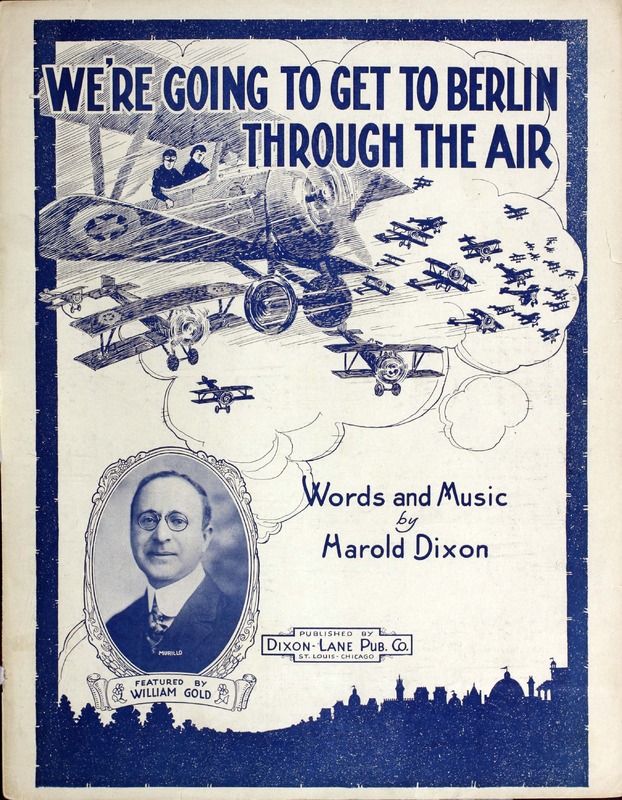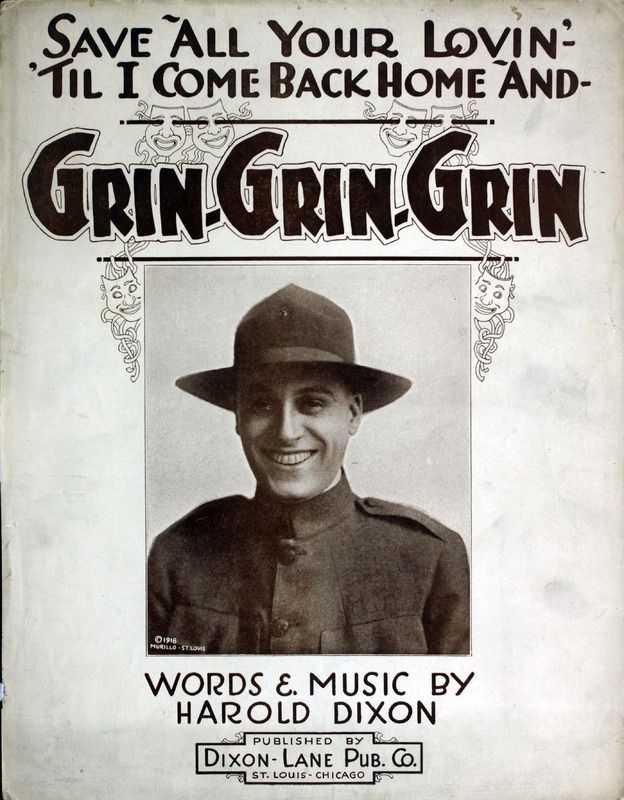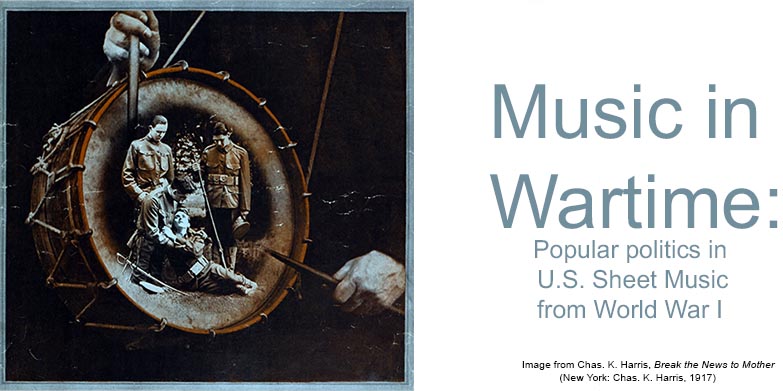St. Louis & the Great War

Title found in Gaylord Music Library Special Collections. Click the image for more details about this item; click here to download a pdf of the score.
St. Louis, Missouri had an active music publishing industry at the beginning of the 20th century. The America & Germany portion of this exhibit examined how these publishers catered to the local community by printing songs with pro-German sentiments. But especially after 1917, St. Louis publishers turned their attention to supporting the 156,000 Missouri natives who enlisted.
Composer-publisher Harold Dixon (dates unknown) of the Dixon-Lane music house composed several songs to boost support for American troops, often explicitly directed to particular branches of the military.
We’re Going to Get to Berlin through the Air (1918) highlights the new role airplanes played in warfare beginning in World War I. Although the United States Air Force would not be established until 1947, the United States Army Air Service was formed in 1918 to provide air support to American land troops during World War I.
Vernon Castle (1887-1918), whom Dixon credits with the idea for his song, was one half of the Vernon and Irene Castle dance duo, a wildly popular social dance team from the 1910s. William Gold, whose photograph appears on the cover, has not been identified.

Title found in Gaylord Music Library Special Collections. Click the image for more details about this item; click here to download a pdf of the score.
In Dixon's Grin-Grin-Grin (1918), Missourian farmer Jasper marches down the street in khaki – that is, he enlists in the Army and puts on his new uniform (see the photograph of an unidentified smiling soldier on the cover.) Grin-Grin-Grin is most notable for the patter chorus on its final page. In a patter song, the performer sings a lot of text very rapidly. The patter song for Grin-Grin-Grin describes the rationing measures introduced by Herbert Hoover, who served as head of the U.S. Food Administration during the war. Hoover encouraged Americans on the homefront to avoid eating certain foods on certain days – for example, no wheat products on Wednesdays.
![Davy of the Navy : your [sic] a wonderful boy / words & music, Harold Dixon. Davy of the Navy : your [sic] a wonderful boy / words & music, Harold Dixon.](http://lib-lslv126.wulib.wustl.edu/omeka/files/fullsize/6ad669d0c7140e3aeeb730a579358f41.jpg)
Title found in Gaylord Music Library Special Collections. Click the image for more details about this item; click here to download a pdf of the score.
Patter songs have been part of comic operas since the 18th century. They were particularly popular in the 19th-century English operettas of W.S. Gilbert (1836-1911) and Arthur Sullivan (1842-1900). Dixon apparently knew Gilbert and Sullivan’s works, because his song Davy of the Navy (1918) quotes from their 1878 show, H.M.S. Pinafore. The Gilbert & Sullivan lyric, “For he’s the Captain of the Pinafore, and a right good captain, too!” is easily adapted to Dixon’s opening line, "For he's a sailor of the U.S.A, and a right good sailor, too!" The Admiral Dewey whom Dixon mentions in the chorus is George Dewey (1837-1917). Dewey, a veteran of the Civil and Spanish-American wars, did not participate in World War I.
![You great big handsome Marine / [by Harold Dixon]. You great big handsome Marine / [by Harold Dixon].](http://lib-lslv126.wulib.wustl.edu/omeka/files/fullsize/09257b5e195124fc9c2ea6695dc6f9b4.jpg)
Title found in Gaylord Music Library Special Collections. Click the image for more details about this item; click here to download a pdf of the score.
You Great Big Handsome Marine (1918), dedicated to the St. Louis Marine Recruiting Party, celebrates the Marines Corps' ability to triumph in any venue: “On the sea he’s goin’ to chase ‘em, and on land he’s goin’ to race ‘em, in the air he’ll drop a bomb on old Berlin.” All three are depicted in the brightly colored cover illustration. A Marine stands at attention on land, with a ship and a biplane in the background. The final page of the score is a recruiting advertisement for the Marine Corps.
Dixon’s lyrics reference the Marne river, indicating he composed the song after the Battle of Belleau Wood, along the Marne in France. This battle, which lasted through most of June 1918, has gone down in Marine Corps history as a particularly bloody, yet strategically important fight, in which the Allied forces won a decisive victory over the German army.
